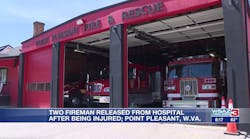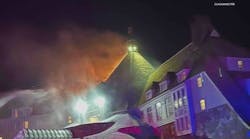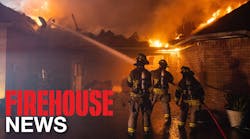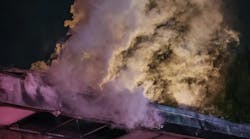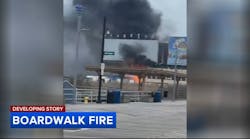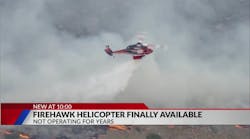When Jim Clack decided it was time to change jobs, the former Minneapolis, MN, fire chief applied to the Baltimore City, MD, Fire Department. He brought with him 22 years of experience — including being unified incident commander in 2007 of the I-35W bridge collapse that killed 13 people — and a bachelor's degree. The applicant pool, for the most part, had the experience, but lacked Clack's educational credentials. And for the first time in its 150-year history, Baltimore City hired a chief from outside the department.
"I'm sure I did well in the interview too," Clack says. But in the past, the city had not perceived higher education as an important criterion for selecting a chief. "It gave me the opportunity to lead this great department."
Clack sees higher education as a vehicle for providing more mobility for individuals changing departments and seeking a better career outlook. "I'm a good example of that. That didn't used to happen in the fire service," he says. Yet as the forces of supply and demand eventually even out the degreed personnel, is there any inclination in government hiring managers showing any sustained growth? The evidence is anecdotal to some extent, depending with whom one speaks.
"I think you need more education as you go up in an organization," Clack says. "It's as simple as being able to write well, a talent lacking in the fire service. Higher education, for one thing, requires you to be able to write clearly. At a minimum, officers should have at least a two-year degree and chief officers need a bachelor's degree. If a chief does not stay up with (his or her educational challenges), he risks his folks missing out."
To debunk the notion that higher education is merely a tool of mobility and as evidence that it really is a movement anchored in the Baltimore City Fire Department, Clack is clear.
"I'm promoting higher education so I will be the last chief this department will hire from outside," Clack says. "We are fully reimbursing tuition…all the way down through the ranks. I'm requiring all appointed chief officers to go to school — no matter what level of college they have. I'm telling them they have to take one course per semester. You have to be always learning, always involved in some form of education. So when I leave several years from now, there will be a number of people who will be qualified to lead this department."
The city has had the means to send its members to college, but it had largely been ignored. "The tuition reimbursement program was in place before I got here; it just wasn't being used," Clack says. "It will be a challenge to find the money as people jump in. And there will always be a resistance to change (as we move toward higher education). Changing this will take a little time and trust."
Who Benefits
"The citizens are the end beneficiaries of higher education," Clack says. "All the other department heads in the city, on the mayor's cabinet, are college educated. For me to come to the table without a degree puts me at a disadvantage among my peers — for things like budget — and being able to articulate the value of our service both verbally and in writing for decision makers. This is critical."
In contrast, Boston, MA, Fire Chief Ronald Keating says his department of 1,450 members does not have a program or incentives to enable employees to attend college, nor is one envisioned. "The city had a plan for tuition reimbursement, but its budget is in dire straits," he says.
"I would be in favor of the upper ranks going to the National Fire Academy and getting the EFO (Executive Fire Officer) designation," says Keating, who was appointed as chief in March 2009. His department does not require a degree to hold its top leadership posts. He explains that the Boston Fire Department has a history of promoting from within, and his recent appointment is no exception.
"I started out as a 'probie' and worked my way up," he explains. "We're sort of in the backwoods here when it comes to educating our people. I have a BS in fire science and have done three courses at the National Fire Academy. It's always a benefit to the individual and definitely a benefit to the organization, but I'm not sure there is a figure for taxpayers" for any benefit in higher education, he says. "If we do have an opportunity for local training, we send (our people). We encourage them to go forward but we don't have any plans to (for higher education)."
Billy Shelton, executive director of the Virginia Department of Fire Programs, sees a recent leveling off in college interest among fire departments nationally. His agency provides funding, training and educational programs to public safety personnel throughout Virginia.
A former federal firefighter and fire chief at Fort Belvoir, an Army command headquarters, Shelton agrees that attaining higher education should be a personal goal for firefighters of all ranks, and one that departments should foster. On many levels, he says, "we need to compete with the police chief, the public works director and the city manager." If we cannot compete, he says, the necessary budget dollars will go elsewhere. Further, "gone are the days where a chief can say that we have done things one way for 40 years and there is no need for change. What happens when that chief retires? He has prepared no one to succeed him. And succession planning is one of the reasons higher education is so important," he says. "If you do not look to (subordinates), we are destined to fail. We must prepare people to succeed us."
The agency recently obtained an articulation agreement with the University of Phoenix. This arrangement allows those graduating with an associate's degree to have their degrees accepted by the university as they move into one of several baccalaureate programs it offers.
"We are looking to get our current fire officers into the 21st century," Shelton says. "This and another initiative driven by the department has succeeded in getting course numbers and textbooks titles standardized for those seeking an associate's degree in the commonwealth…We are all-hazard responders; we need to know. Completing a college degree is one of the best ways for someone to connect the dots as he or she moves from training into the real-life situations encountered daily by firefighters.
Big Departments, Little Interest
Higher education initiatives at departments in the Northeast contrast with the area's sheer number of firefighters and the some of the county's largest departments. Warren Campbell, a former field training specialist at U.S. Fire Administration's National Fire Academy, said he experienced a frustrating lack of interest as he took higher education courses on the road to various sections of the country. "We offer to hold three courses" free to all parties. In the Northeast, he explains, "we might fill two of the three courses."
The Fire and Emergency Services Higher Education (FESHE) program is in 11th year, Campbell points out. "And the economy has not been bad throughout that period. I don't think it is monetary. The economy is an easy target. The culture (of departments) is to blame," he says. But that culture, which in some cases has ignored higher education, is changing he says.
"It's already happening internationally. If you look at our military, says the 21-year military veteran — "which is arguably the best in the world — education plays a major role. Ninety-five percent of officers entered the service as an officer; not in an enlisted position." The military is able to develop "a good officer corps with good training and education," he says.
The FESHE program promotes higher education in the fire service through standardized undergraduate curriculum and seeks to standardize competency-based degrees. It is aiming to develop a decentralized organization that will allow community-based participants to evolve the mission of FESHE to fit their needs. Its paramount goal is to reduce life and property loss through higher education.
Vermont Technical College (VTC) is a recent example of FESHE's versatility in helping a higher education program gain the consistency and provide a platform for its initiation.
"We just graduated our first class this spring," says Peter Maloska, program director and assistant professor at VTC. "We used the FESHE model as a starting point for curriculum. We also developed many partnerships and altered the program a little."
As Vermont's nascent program develops, Maloska and the college's statewide six-member advisory board will evaluate and fine tune the curriculum and its delivery. "The program goal is to have our students have the opportunity to obtain an associate's degree, Vermont certification as Firefighter 1, national EMT-B and be certified at the hazardous materials operations level."
Cognizant of the need to present adult learners with useful on-the-job experience in its educational plans, Maloska emphasizes real-world fire service applications.
"For example," he said, "in the Fire and Life Safety Educator course, we partner with the Vermont Division of Fire Safety to use a 'safe house' trailer. Students prepare lesson plans, utilize the ICS (Incident Command System) to prepare and conduct a fire prevention day. ICS is used anytime we conduct a program. We also partner with the Initiative for Rural Emergency Medical Services at UVM to conduct our EMT-B program. The Vermont Fire Academy is our partner for the Firefighter 1 program. These examples illustrate the basic model and how we used content to balance the training and education components."
Maloska is encouraged by the fire department support he has received for his program. "The fire chiefs were instrumental in getting this program up and running," he says. "Vermont did not have a higher education program in fire science prior to this…and the chiefs were strong advocates for its inception."
Washington, DC, Fire Chief Dennis L. Rubin explains his view of higher education in an historical context. "I have had a chance to go to work in our business since 1971," he says. "I have seen nothing but aggressive movement toward it becoming a true profession in our nation. As we continue down that path, the requirements placed upon us to have education at fairly high levels grow."
Rubin runs a department that he says, "commands a $200 million budget and 2,400 employees." No small task, especially given the importance of some target occupancies. "I feel pretty strongly that higher education is a must....I'm convinced that everyone associated with the delivery of our service benefits from advanced education...Our citizens…they expect us the make the best decisions and make the most of their hard-earned tax dollars."
Rubin also agrees with other fire service leaders about the relative merit of a degree. "The individual is able to play at a level where perhaps without an appropriate level of advanced education would not be able to do so," he says. "For instance, if you're in a meeting (where other staff members have college degrees) and the fire chief has a high school education…I think we will always be looked down upon. The need for us to play in an arena…where higher education is required has arrived."
Rubin's department offers assistance for those degree-seeking members. "We have a way of using the University of the District of Columbia for college classes…and members get tuition reimbursement," Rubin explains. The department also provides annual leave incentives for taking classes. "We believe candidates will be much more competitive in the written and oral assessments (for promotion.) Higher education is highly encouraged in our systems. And I wish we could offer a pay premium for higher education, but it must go through a process…it is not as easy as chief's decree." Rubin has associate's and bachelor's degrees and is working toward a master's degree at Oklahoma State University.
Baltimore's Clack admits that the fire service lags behind other public sectors. "It goes beyond the bargaining table…it has labor implications as well for comparable jobs in the city," he says. "We are embarking on a program to set goals to require Fire Officer 1 for company officers and so forth for higher positions. We are trying to get caught up to our neighbors....We are fortunate here in Baltimore City. We are surrounded by good college programs. We are very close to the National Fire Academy, which I think is a great institution." The veteran administrator holds a bachelor's degree in fire administration and is a graduate of the Executive Fire Officer Program at the National Fire Academy. He is pursuing a master's degree from St. Mary's University in Minnesota.
The realm of higher education in the fire service is changing along with the old guard. New job demands, fewer tax dollars and a public that expects more from its public service sector are propelling these changes in the Northeast, as well as elsewhere.
PAUL SNODGRASS, a Firehouse® contributing editor, is a firefighter with the Sarasota County, FL, Fire Department and a former fire chief. He is on the faculty at the University of Florida and an adjunct fire science instructor at Hillsborough Community College in Tampa, FL, and Cogswell Polytechnical College in Sunnyvale, CA. Snodgrass holds a bachelor's degree in political science from Augsburg College and a master's degree in education from the University of Phoenix. He has been writing about, designing and teaching online courses since 2005. He can be reached at [email protected].
